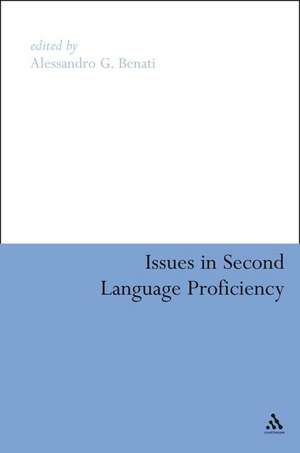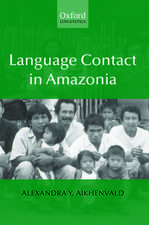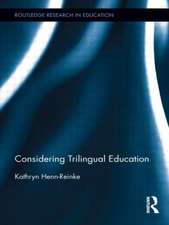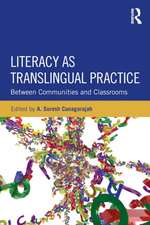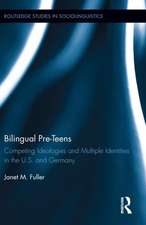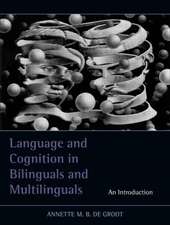Issues in Second Language Proficiency
Editat de Professor Alessandro G. Benatien Limba Engleză Paperback – 26 oct 2011
Benati provides clarity about the characteristics and notion of language proficiency in the field of second language acquisition. He looks at four areas of research paradigmatically related to the role of proficiency: theorizing and measuring second language proficiency; the dimensions of L2 proficiency; factors contributing to the attainment of L2 proficiency and attaining L2 proficiency in the classroom.
It also contains a variety of research accounts about the specific factors which have an effect on proficiency together with a theorised measurement of proficiency in second language research. It will be required reading for researchers in applied linguistics and second language acquisition.
Preț: 257.86 lei
Nou
Puncte Express: 387
Preț estimativ în valută:
49.36€ • 53.63$ • 41.49£
49.36€ • 53.63$ • 41.49£
Carte tipărită la comandă
Livrare economică 22 aprilie-06 mai
Preluare comenzi: 021 569.72.76
Specificații
ISBN-13: 9781441182326
ISBN-10: 1441182322
Pagini: 270
Ilustrații: 20
Dimensiuni: 156 x 234 x 14 mm
Greutate: 0.38 kg
Editura: Bloomsbury Publishing
Colecția Continuum
Locul publicării:London, United Kingdom
ISBN-10: 1441182322
Pagini: 270
Ilustrații: 20
Dimensiuni: 156 x 234 x 14 mm
Greutate: 0.38 kg
Editura: Bloomsbury Publishing
Colecția Continuum
Locul publicării:London, United Kingdom
Caracteristici
Second language acquisition and second language proficiency are large areas of study and research.
Notă biografică
Alessandro G. Benati is Professor in Second Language Acquisition and Director of Research and Enterprise at the University of Greenwich, UK.
Cuprins
Acknowledgements
Introduction
1. Attaining second language proficiency, Alessandro Benati (University of Greenwich, United Kingdom)
Part I: Theory and dimensions of second language proficiency
2. What is 'priming', and what might priming techniques be able to tell us about L2 learning and proficiency? Emma Marsden (University of York, United Kingdom)
3. Cross-linguistic influence in L2 verb frames: the effects of word familiarity and language proficiency, Christopher J Hall (York St John University, United Kingdom) and Areli Reyes (Universidad Autónoma de Tlaxcala, Mexico)
4. The role of working memory in the development of L2 grammatical proficiency, Clare Wright (Newcastle University, United Kingdom)
Part II: Factors contributing to the attainment of L2 proficiency
5. Statistical learning and innate knowledge in the development of second language proficiency: evidence from the acquisition of gender concord, Roger Hawkins (University of Essex, United Kingdom)
6. Metalinguistic knowledge: A stepping stone towards L2 proficiency? Karen Roehr (University of Essex, United Kingdom) and Gabriela Adela Gánem- Gutiérrez (University of Essex, United Kingdom)
7. The development of vocabulary proficiency in relation to learning style, Paul Booth (Kingston University, United Kingdom)
8. Second language reading proficiency and word recognition: The concept of saliency and its application across different scripts, Mick Randall (British University in Dubai, Dubai)
9. L2 proficiency: measuring the intelligibility of words and extended speech, Sara Kennedy (McGill University, Montréal, Canada)
10. English with a native-like accent: an empirical study on proficiency, Tanja Angelovska & Angela Hahn (University of Munich, Germany) Part 3: Attaining L2 proficiency in the classroom
11. Formal intervention and the development of proficiency: the role of explicit Formation, Bill Van Patten (Texas Tech University, United States of America)
12. Secondary and cumulative effects in attaining L2 proficiency in the classroom. Alessandro Benati (University of Greenwich, United Kingdom), James Lee (University of New South Wales, Australia) and Cecile Laval (University of Greenwich, United Kingdom)
13. Models of speaking and the assessment of second language proficiency. Peter Skehan (Chinese University of Hong Kong, China)
14. Researching task difficulty: towards understanding L2 proficiency. Parvaneh Tavakoli (London Metropolitan University, United Kingdom)
15. On transfer, proficiency and cross-individual/aggregate SLA differences: Examining Adjectival Semantics in L2 Spanish, Pedro Guijarro-Fuentes (University of Plymouth, United Kingdom), Tiffany Judy (University of Iowa, United States of America) and Jason Rothman (University of Plymouth, United Kingdom)
Introduction
1. Attaining second language proficiency, Alessandro Benati (University of Greenwich, United Kingdom)
Part I: Theory and dimensions of second language proficiency
2. What is 'priming', and what might priming techniques be able to tell us about L2 learning and proficiency? Emma Marsden (University of York, United Kingdom)
3. Cross-linguistic influence in L2 verb frames: the effects of word familiarity and language proficiency, Christopher J Hall (York St John University, United Kingdom) and Areli Reyes (Universidad Autónoma de Tlaxcala, Mexico)
4. The role of working memory in the development of L2 grammatical proficiency, Clare Wright (Newcastle University, United Kingdom)
Part II: Factors contributing to the attainment of L2 proficiency
5. Statistical learning and innate knowledge in the development of second language proficiency: evidence from the acquisition of gender concord, Roger Hawkins (University of Essex, United Kingdom)
6. Metalinguistic knowledge: A stepping stone towards L2 proficiency? Karen Roehr (University of Essex, United Kingdom) and Gabriela Adela Gánem- Gutiérrez (University of Essex, United Kingdom)
7. The development of vocabulary proficiency in relation to learning style, Paul Booth (Kingston University, United Kingdom)
8. Second language reading proficiency and word recognition: The concept of saliency and its application across different scripts, Mick Randall (British University in Dubai, Dubai)
9. L2 proficiency: measuring the intelligibility of words and extended speech, Sara Kennedy (McGill University, Montréal, Canada)
10. English with a native-like accent: an empirical study on proficiency, Tanja Angelovska & Angela Hahn (University of Munich, Germany) Part 3: Attaining L2 proficiency in the classroom
11. Formal intervention and the development of proficiency: the role of explicit Formation, Bill Van Patten (Texas Tech University, United States of America)
12. Secondary and cumulative effects in attaining L2 proficiency in the classroom. Alessandro Benati (University of Greenwich, United Kingdom), James Lee (University of New South Wales, Australia) and Cecile Laval (University of Greenwich, United Kingdom)
13. Models of speaking and the assessment of second language proficiency. Peter Skehan (Chinese University of Hong Kong, China)
14. Researching task difficulty: towards understanding L2 proficiency. Parvaneh Tavakoli (London Metropolitan University, United Kingdom)
15. On transfer, proficiency and cross-individual/aggregate SLA differences: Examining Adjectival Semantics in L2 Spanish, Pedro Guijarro-Fuentes (University of Plymouth, United Kingdom), Tiffany Judy (University of Iowa, United States of America) and Jason Rothman (University of Plymouth, United Kingdom)
Index
